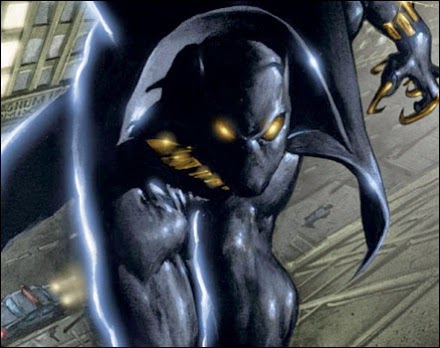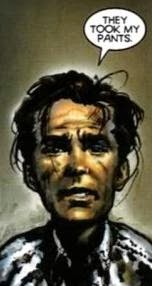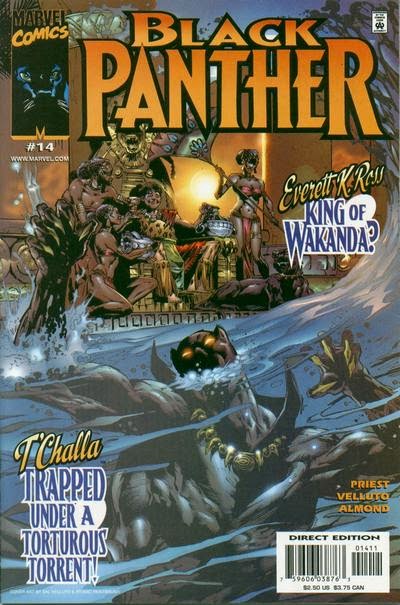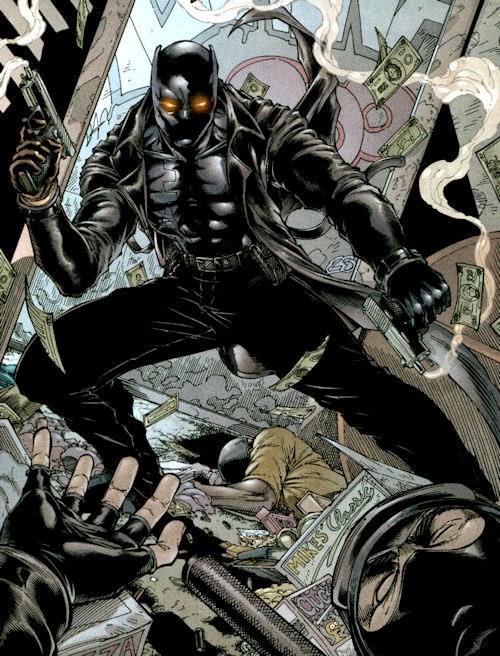I recently subscribed to Marvel Unlimited, a Netflix-esque system that gives me all-I-can-eat Marvel comics for a fairly low price. Not bang-up-to-date ones, but I’ve not read half the comics I wanted to over the last decade due to financial concerns, so I can keep trawling for a while.
However, as well as striking out for new material, I’ve also re-read some old favourites, and I’d like to talk about one of those now: Black Panther by Christopher Priest and various artists, a series that ran from 1998 to 2003. The Black Panther character has existed since 1966, King of a fictional African nation called Wakanda, and mostly associated with standing in the backdrop of Avengers groupshots in the later decades of the twentieth century.
Attentive readers may note Priest also wrote Quantum & Woody, a series even closer to my heart than Black Panther. I started reading Panther due to following Priest over from Q&W, barely knowing who the character was, and Priest made me love it in approximately one issue. If you want a gushing tribute to Q&W, here’s one I wrote in September 2012.
But anyway. Black Panther. What was that about?
“The bathroom had no door. I still had no pants.” – Everett K. Ross wins my heart in one page.
As you may have guessed from both the name and his status as King of an African nation, the Black Panther (aka T’Challa) lives outside the standard white American superhero demographic. And yes, particularly in the old days, black superheroes did have a bad habit of having the word Black in their alias.
Characters outside the standard demo didn’t tend to hit mega-sales in the pre-2010s US mainstream Marvel/DC comic market, but Priest found ways to embrace that. First up, he introduced Everett K. Ross, T’Challa’s new state department liaison and self-proclaimed King of Useless White Boys. With Ross serving as narrator, comic relief, audience POV character and exposition monkey, Priest took a different tack with the title character.
He made Black Panther effortless, dangerous and scary, and T’Challa a ruthless, brilliant schemer with the world’s finest poker face, an enigma one step withdrawn from the reader thanks to the Ross-focused storytelling. He also dug into the real implications (or as real as you can get in a fictional superhero universe) of the politically active King of a nation choosing to wear tights and play superhero, and the international politics of the Marvel Universe. All while Everett K. Ross flippantly monologued about the oddness of superheroes and explained T’Challa’s labyrinthine plots to us.
And seriously, labyrinthine is not hyperbole. I was in my mid-to-late teens when this comic came out, and re-reading it at the ancient age of thirty, I now realise how little of it I understood, especially in the latter, really confusing storylines. The out-of-sequence storytelling in the opening two or three years didn’t help matters, nor did reading it in twenty-two page monthly chunks.
Ironically, comics have milked death beyond death
All those things probably contributed to the constantly middling sales on Black Panther, but reading back now, I’m glad Priest stuck to his guns, as it’s great. A uniquely idiosyncratic, smart take on a genre that really has been milked to death and back again. People talk about adult comics as the ones with tits and blood, but this is adult in the sense that it can be denser than a lot of political thrillers. In many ways ahead of its time, considering how much reading comics in collected edition format has exploded in the 2000s, not to mention recent industry moves to diversify a little from the white male superhero demo.
I’ve focused on the writing as that’s my area of interest, but I would be a prick not to mention the artwork – especially the gorgeous painted art by Mark Texeira and Joe Jusko in early issues and the reliably beautiful, clear, emotive work by Sal Velluto after that.
Sadly, Priest’s Black Panther had the poor fortune to be published just before collected editions of everything became standard practice, so it’s not available through many venues – except the afore-mentioned Marvel Unlimited, which has it free and easy, but for some reason it’s not on Comixology yet. Well, they have one issue, but it’s a midstoryline episode published because it crosses over with Deadpool, and would be utterly incomprehensible to a new reader.
Indeed, the series as a whole is quite dense on Marvel Universe guest stars at times. Still, considering we now live in a world where everyone in the geekosphere knows roughly who the Avengers are, it’s worth a go if you can find it and fancy a good, different superhero read.
Post-Panther Notation
The above is talking about the bulk of the Black Panther series by Priest, specifically issues #1-49. After that, other things happened…
- With #50, the series underwent radical retooling – Priest stayed on as writer, but New York cop Kasper Cole took over as Black Panther after finding a costume abandoned in an alleyway. Cole’s adventures never hit the dizzy joyous heights of the best Priest/T’Challa/Ross stories, but they’re good, engaging super-crime stuff.
- Alas, the Kasper Cole revamp was not enough to get sales up, and the book ended with #62. Which is about fifty more issues than a low-selling book gets nowadays.
- Proving that point, Priest and artist Joe Bennett launched an ensemble book called The Crew partly spinning out of Black Panther, featuring Kasper Cole teaming up with a few other characters. It lasted seven issues, and that’s a shame, as it was excellent. Also available on Marvel Unlimited, happily.
- Priest himself hasn’t done much in comics since the early 2000s, but seems to be dipping his toe back into the water at the moment, with an upcoming Quantum & Woody sequel mini-series and a short story in a recent Deadpool anthology issue. My fingers are predictably crossed that this leads to more – and not necessarily on existing superhero characters, I’d be just as up for a new property for a smaller company.
- If you want more in-depth (and at times brutally honest) essays on Panther from the author himself, there’s a few on his website.
More blognotes may follow if I want to spotlight anything good on Marvel Unlimited. Or I might just plough through endless old Avengers and X-Men issues rather than taking the time to write about them. Let’s wait and see!




